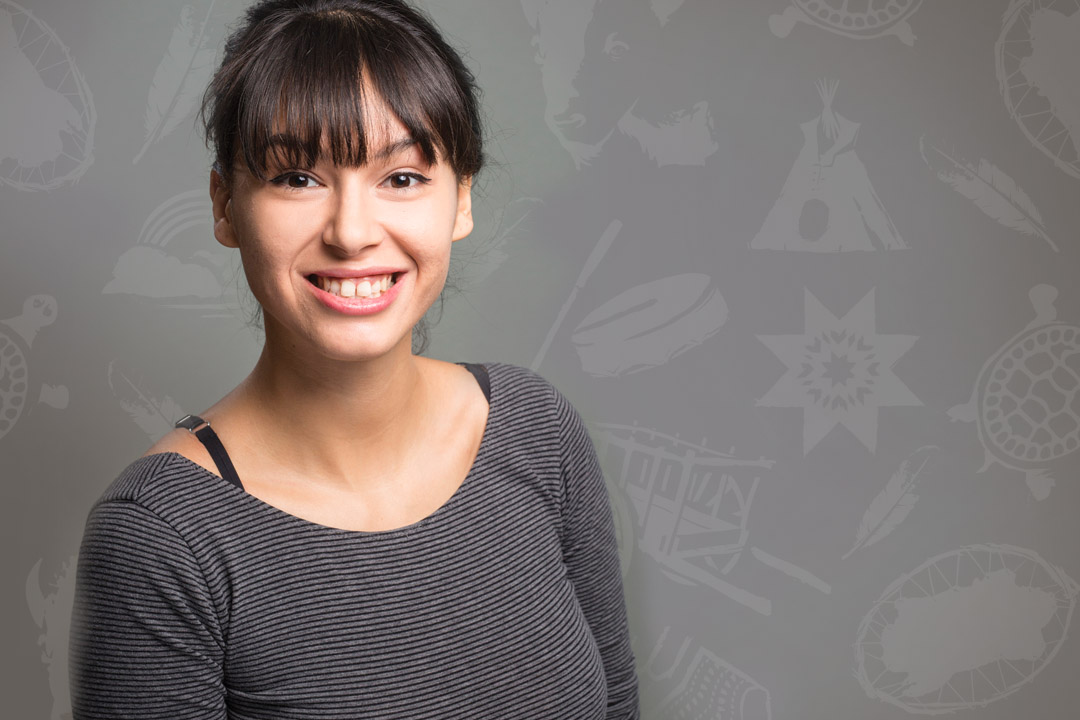
Meet the Aboriginal Student Achievement Award winners: Annette Pegg
Annette Pegg is from the Kawacatoose First Nation and is in her first year of medicine with the hopes of becoming a rural physician.
By Jordan SherbinoThis week the University of Saskatchewan is celebrating Aboriginal Achievement Week with a range of cultural events, discussion panels, artistic activities and celebrations.
Each year, there is an awards ceremony to honour Indigenous students and to recognize their academic accomplishments, leadership, research endeavours or community volunteerism.
One of the award winners this year is Annette Pegg, a first-year student in the medical doctor program in the College of Medicine, who is receiving an award for the leadership she has shown.
Annette is from the Kawacatoose First Nation and is the first in her family to attend university. She has a bachelor’s degree in biochemistry and has received many scholarships and awards for her academic accomplishments.
Annette developed a passion for volunteering and giving back to her community. She has worked on projects as diverse as helping to coordinate the North American Indigenous Games and organizing alley clean-ups in Regina. She currently serves as the local officer of Indigenous health for the Canadian Federation of Medical Students and is a member of the Aboriginal, Rural and Remote Health Group.
We caught up with Annette to ask her a few questions about her experiences in university and what inspires her to pursue her career goals.
What does it mean to you to be the first university graduate in your family?
Being the first to attend university in my family has been quite daunting as there were no expectations for me to get very far. My family loves and supports me no matter what I choose to do, so I needed to have an intrinsic sense of motivation. I had no positive role models growing up and I had to make a lot of positive life changes over the years in order to ensure that I succeeded.
My nieces and nephews have become my main motivation for getting up in the morning for class and studying into the wee hours of the morning. I want the younger generations to know someone who has acquired a post-secondary education against the odds and the negative influences we grow up with. I want them to know that their struggles growing up don’t have to break you down and that adversity can actually strengthen who you are.
What got you interested in becoming a rural physician?
As an Aboriginal person, I have experienced living on a reserve, growing up in poverty and being discriminated against based on my race. These experiences allow me to better connect and empathize with Aboriginal patients.
Today, the Aboriginal community faces many issues with access to quality and culturally-sensitive care. Being a physician will allow me to be an educator, a role model and a healer. Working in a rural setting is an exciting opportunity if you are the type of person who likes to learn about many different specialties instead of just focusing in on one.
What has your experience in the College of Medicine been like so far?
A: At first, I felt very isolated as I don't come from a ‘typical’ medical student background. Thankfully, I have very welcoming and diverse classmates. It no longer feels like the competitive atmosphere of my science undergrad as we are all very supportive in helping each other to succeed. It feels great to be in a position where I am able to make a positive impression of Aboriginal people that breaks away from the negative stereotypes perpetuated in our society. It is also a very exciting time to be an Aboriginal person in medicine as there are many strides being made towards reconciliation and decolonizing the university and the healthcare field.
To learn more about the events that are taking place this week, be sure to check out the Aboriginal Achievement Week website.

